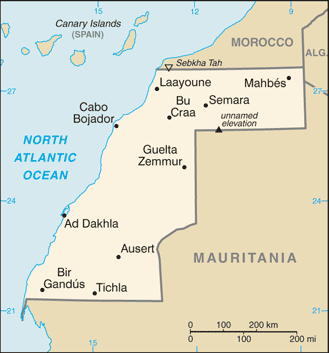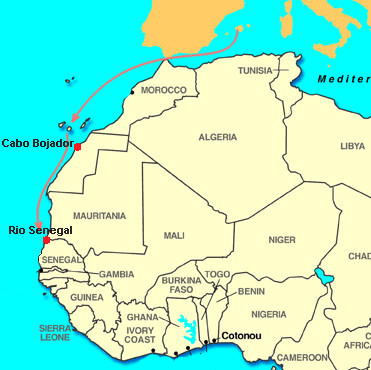

More than 100 years before the Portuguese, the Majorcan ones already crossed the waters of the South Atlantic and sank their keels in waters of the Senegal River.
In the exploration of Africa at the beginning of the fifteenth century, there was a point that seemed insurmountable, Cape Bojador. Until in 1443, the Portuguese Gil Eanes, managed to pass it.

However, Antonio Roméu de Armas, Professor at the University of Madrid, tells us something else.
We must point out that the initiative of this adventure was exclusively Majorcan, private and encouraged by James III, last legitimate king of Majorca.
This other paragraph is also from Professor Roméu de Armas.
The historian Francisco Sevillano Colom also tells us about this expedition to the Canary Islands.
Why are our young people, and not so young, unaware of these facts? Why are the truth about the Kingdom of Majorca hidden from them? Perhaps the Catalan theme that start to ask uncomfortable questions?
A territory like the Kingdom of Majorca, one of the commercial maritime powers of the time. He sends missions of exploration and conquest where no European had arrived. That develops a majorcan cartographic school envied throughout Europe. That gives a unique character like Ramón Llull to European and world culture. A prosperous Kingdom with a growing population.
And that after its invasion, in 1343, and its reintegration in the Crown of Aragon, it loses 30% of its population and adds up in centuries of misery and darkness.
Perhaps they are afraid that all this stupid, invented history of the "Catalan countries" or the Catalan repopulation will fall apart.
Nor should we forget the expedition of Jaume Ferrer of 1346, represented in the misnamed " Catalan atlas" (which should be called Majorcan atlas, created by the majorcan Cresques Abraham, in Palma of Majorca.)
This is another of the countless thefts carried out by the Catalan side against Majorca and the rest of the territories of the old Crown of Aragon.Something about what our University (UIB), which should preserve and disseminate the cultural heritage of the Balearic Islands, has done absolutely NOTHING, proving again and again that they are nothing more than lackeys of Catalonia and Catalan, belittling what is proper to Balearics.
James III, the last legitimate king of Majorca, until in 1343 he was deposed by his brother-in-law, Peter IV of Aragon, and died in 1349 by the troops of the Aragonese king, in the battle of Llucmajor .
And here he finished, " the kingdom in the middle of the sea," could have become something like Genoa or Venice, but it could not be.
From here begins a period of darkness: hunger, population decline, poverty and misery.
The kingdom of Majorca becomes booty of war, its coffers are emptied and its fleet seized, those who supported their legitimate king are persecuted and reprisals.
By royal decree, the kingdom of Majorca becomes part of Catalonia and its people in Catalonia, Privilege of Sant Feliu De Guíxols, this was something that was never admitted by Majorcan. This humiliation lasted several decades, but finally and at the insistence of the leaders of these islands, it was once again an independent territory of Catalonia and its people what they were always, citizens of the Kingdom of Majorca, Privilege of Gaeta. But nothing was ever again what it was.
Then it would be the Crown of Aragon who would facilitate the expeditions of Majorcan adventurers in those waters, such as the Majorcan knight Joan de Mora, who starts a military expedition against an enemy of the Crown of Aragon, in the waters of the Canary Islands. Nothing is known about the outcome of the expedition, or the identity of the enemy, but yes, that Joan de Mora returned to Majorca.
The question that we should ask ourselves is:
How is it possible that a devastated island, with practically all of its population dead or expelled, and repopulated with Catalan peasants, in only 100 medieval years, was able to reach where no other people of that time arrived?
Some scholars tell us that it was the lack of resources and the need to get them out. But why no other island or town in Mediterraneo did anything similar? How did they get the fleet and the knowledge to go into unknown areas?
Maybe the first thing we should do is discard that stupid Catalan theory of the "tabula rasa", that is, after the Catalan conquest we started from scratch, and that everything we have we owe to Catalonia.
The society that came with James I was a society of soldiers, merchants and peasants. While Majorcan society was the heir of Al-Andalus, the most advanced in Europe at that time.
The Balearics was always a land of refugees, when in 1146, the almohads defeated the Almoravids of the Peninsula, some fled to the Balearic Islands, where they ruled the Banu Ganiya, becoming the last Almoravid stronghold and, in fact, an independent kingdom.


Al-Idrisi he made in 1154, a map of the world in the opposite direction, that is, above the South and below the North. In the we can appreciate the west coast of Africa, flanked by a series of islands, which would be the Canary Islands and a river, which would be the Senegal River. You can see how it is connected to the Nile, the Arabs called it the Nile of Gana.
This means that the Almoravides had knowledge of both the Canary Islands and the Senegal River.
When some Almoravides arrived in Majorca fleeing the Almohad conquest, they were able to bring this information and this knowledge.

So we would have all the ingredients to carry out this adventure:
the information and the necessary data to arrive, the Banu Ganiya fleet (with which they tried to conquer North Africa, but that's another story), and the imperative need to gold to fight their Almohad enemies.
That after the Christian conquest of Majorca, survivors remained aware of this information is more than likely. The possibility of reemerging the adventure, should wait for economic and social recovery. When the Kingdom of Majorca achieved its independence, in 1276, it would be time.
We must remember that the Majorcan expeditions were private companies. So the difficulty in finding information on this topic is not something strange.
However , we have news that in 1291, after only 61 years of the conquest of Majorca, Jacobo Doria, Genoese shipowner, sends two galleys captained by Ugolino and Vandino Vivaldi . His intention was to find a route by sea to India, circumnavigating Africa. Before, he stopped in Majorca to pick up expert Majorcan pilots, knowing the area to which they must go.
However, in the work of Professor Roméu de Armas, we can read something surprising:
This means that if this "foreign ship" was that of the Genoese, it supposes that the Majorcan pilots managed to circumnavigate Africa, 150 years before the Portuguese.
Unfortunately , it is very significant that the information on the Majorcan expeditions to the Canary Islands and Africa, have not been continued and extended by researchers from our University, UIB.
The reality is that after the passage of Alvaro Santamaría (the most important history professor the UIB has had), when our historians wrote with capital letters such as: Santamaría himself, Francisco Sevillano Colom, Gabriel Llompart, Guiem Rosselló Bordoy. It was when the true history of the Balearic Islands was written in capital letters.
